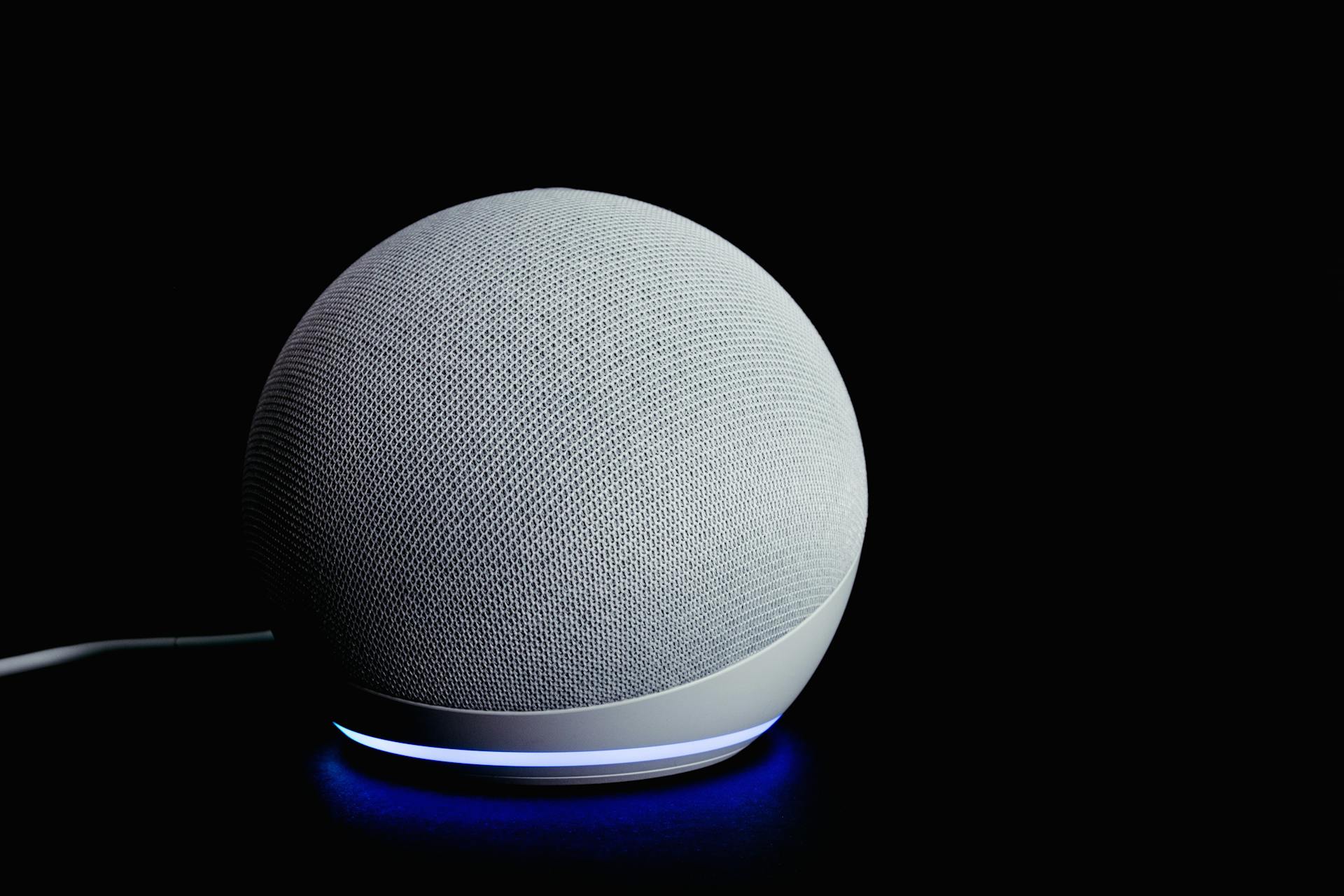
Alexa Generative AI is revolutionizing the smart home industry, making it possible to control and interact with devices in more intuitive and personalized ways. According to research, Alexa's generative AI can learn and adapt to a user's habits and preferences over time.
This means that Alexa can anticipate and fulfill a user's needs before they even ask, making the smart home experience more seamless and convenient. For example, Alexa can automatically adjust the lighting and temperature in a room based on the user's schedule and preferences.
As a result, users can enjoy a more hands-free and automated smart home experience, freeing up time and energy for more important things.
Generative AI
Amazon is incorporating generative AI into its Alexa voice assistant, enabling it to have more open-ended conversations like ChatGPT and Google Bard.
Alexa's new custom-built large language model (LLM) allows it to generate responses on its own, rather than relying on predetermined outputs or contributors. This means Alexa can now offer greater contextual engagement and shed its reliance on external contributors.
Amazon is also developing a speech-to-speech model that will unify tasks like speech recognition, LLM generation, and text-to-speech production, creating a richer conversational experience.
For more insights, see: Amazon Connect Generative Ai
What is Generative AI?
Generative AI is a type of artificial intelligence that can create new content, such as text, images, or even conversations, on its own. This technology is being used in various Alexa skills, like Character.AI's "Librarian Linda" and Volley's 20 Questions game, which can understand and respond to voice interactions in a human-like way.
The Volley game is a great example of generative AI in action, allowing players to ask questions and receive responses from the AI Riddlemaster. This game marks a major milestone in gaming and is one of the first LLM-based games that players can interact with naturally using just their voice.
Generative AI can also be used to create new content, like music, as seen in the Splash Alexa skill. This skill allows users to write and record a song purely by voice control, choosing a musical genre and adding lyrics to create a custom composition.
One of the key benefits of generative AI is its ability to understand and respond to human language, making it feel more natural and human-like. This is evident in the way Alexa skills like Volley and Splash can engage with users in a conversational manner.
A unique perspective: Which Is One Challenge in Ensuring Fairness in Generative Ai
Generative AI Skills
Alexa's new skills are revolutionizing the way we interact with the voice assistant.
Amazon's partnership with Character.AI has brought real-time conversations with synthetic people to Alexa.
Users can engage with knowledgeable characters like 'Librarian Linda' and imaginative versions of historical figures like Socrates.
Volley's new Alexa Skill reworks the classic "20 Questions" game through generative AI and voice interactions.
It's one of the first LLM-based games that players can speak to naturally using just their voice.
Splash's Alexa Skill guides users through writing a song purely by voice control.
Users can decide on a musical genre, add lyrics, and either rap or sing along to the composition.
On a similar theme: New Generative Ai
Amazon's AI Plans
Amazon is developing a speech-to-speech model that will unify tasks and create a richer conversational experience.
This new model will allow Alexa to generate responses on its own without relying on human contributors, making it a more autonomous and contextual assistant.
Amazon's SVP Rohit Prasad mentioned that the company is working on enhancing Alexa's conversational abilities and making it more human-like.
A different take: Amazon Lex Generative Ai
Alexa can now offer greater contextual engagement and shed its reliance on Alexa Answers contributors, thanks to its new large language model (LLM).
Amazon's Echo smart speakers have been a loss leader, with the company losing $25 billion between 2017 and 2021, and $10 billion in 2022 alone.
Despite this, Amazon has signaled that it's not ready to abandon its smart assistant, and is instead focusing on leveraging generative AI to enhance Alexa's capabilities.
Amazon has been encouraging third-party developers to create more useful skills for Alexa, and has been working on enhancing the assistant's conversational abilities.
Generative AI could be transformative for Alexa, allowing it to offer more natural and human-like conversations, and making it a more valuable tool for users.
Key Takeaways
Amazon's new Alexa Plus subscription is likely to arrive soon, with some earlier rumors suggesting an October launch that didn't pan out. The subscription could cost as much as $10 per month.
Alexa Plus is expected to offer a number of AI-centric features and additions, which will make the voice assistant more capable and conversational. This includes the ability to have conversations with far better contextual understanding, without having to repeatedly use the "Alexa" wake word.
The new update to Alexa is the most significant one since the voice assistant first burst onto the scene, and it's tipped for release in late November or December.
A fresh viewpoint: Generative Voice Ai
Frequently Asked Questions
How do I enable AI on Alexa?
To enable AI on Alexa, sign in to Ai-Sync and follow the steps to link your device to the "Smart Home" section of the Alexa app. Enable the "Ai-Sync" skill by searching for it in the "Your Smart Home Skills" section.
Sources
- https://www.spiceworks.com/tech/tech-general/articles/amazon-devices-and-services-event/
- https://www.theverge.com/2023/9/20/23880764/amazon-ai-alexa-generative-llm-smart-home
- https://www.pocket-lint.com/amazon-ai-alexa-subscription-may-come-in-october/
- https://ctrlf5.software/blog/as-alexa-turns-10-amazon-looks-to-generative-ai/
- https://voicebot.ai/2024/01/10/amazon-alexa-showcases-new-generative-ai-experiences-from-character-ai-volley-and-splash/
Featured Images: pexels.com


